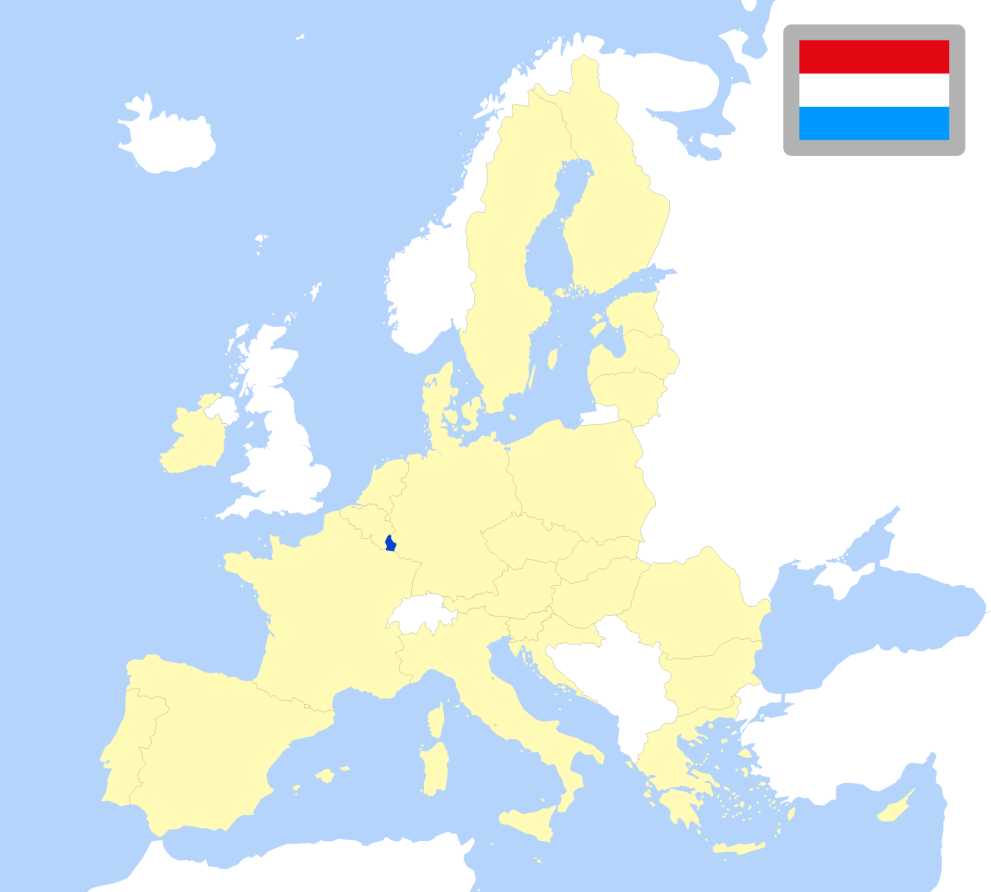Overview
Capital: Luxembourg
Official EU language(s): French, German
EU Member State: since 1 January 1958
Currency: euro (€)
Euro area: member since 1 January 1999
Schengen: member since 26 March 1995
Figures:
- Geographical size: 2 595 km2
- Population: 681 973
(Source: Eurostat - 2025 figures for geographical size and population)

Political system
The Grand Duchy of Luxembourg is a parliamentary constitutional monarchy (Grand Duchy). The prime minister is the head of government. The Grand Duke who is the head of state only has formal rights. The government exercises executive power. General elections take place every 5 years. 60 members are elected to a single-chamber legislative body, the Chamber of Deputies.
The country is divided into 4 electoral regions, 12 administrative cantons and 105 communes. 12 of the communes have city status, the largest being Luxembourg City. Luxembourg City, together with Brussels and Strasbourg, is one of the three official seats of the European institutions. Luxembourg has three official languages: French, German and Luxemburgish. The first two are official EU languages.
Trade and economy
Luxembourg has the highest GDP per capita in the European Union with €92 200, well above the EU average (€38 100). It accounts for 0.5% of the EU's total GDP.
(Source: Eurostat - 2023 figures for GDP per capita and GDP)
(Source: Eurostat - 2024 figures for exports and imports)
There are 6 representatives from Luxembourg in the European Parliament. Find out who these Members of the European Parliament are and follow the activities of the European Parliament’s office in Luxembourg.
In the Council of the EU, national ministers meet regularly to adopt EU laws and coordinate policies. Representatives from the Luxembourgish government attend Council meetings focused on their area of responsibility several times a year.
The Council of the EU does not have a permanent, single-person president (like the Commission or Parliament). Instead, its work is led by the country holding the Council presidency, which rotates every 6 months.
During these 6 months, ministers from that country's government chair and help determine the agenda of Council meetings in the different policy areas, and facilitate dialogue with the other EU institutions.
Dates of Luxembourgish presidencies:
Jan-Jun 1960 | Jan-Jun 1963 | Jan-Jun 1966 | Jan-Jun 1969 | Jan-Jun 1972 | Jan-Jun 1976 | Jul-Dec 1980 | Jul-Dec 1985 | Jan-Jun 1991 | Jul-Dec 1997 | Jan-Jun 2005 | Jul-Dec 2015 | Jan-Jun 2029
The European Commissioner nominated by Luxembourg is Christophe Hansen who is responsible for agriculture and food.
The Commission is represented in each EU country by a local office, called a "representation". Find out more about the Commission's representation in Luxembourg.
Luxembourg has 6 representatives on the European Economic and Social Committee. This advisory body – representing employers, workers and other interest groups – is consulted on proposed laws, to get a better idea of the possible changes to work and social situations in different countries.
Luxembourg has 6 representatives on the European Committee of the Regions, the EU's assembly of regional and local representatives. This advisory body is consulted on proposed laws, to ensure these laws take account of the perspective from each region of the EU.
Luxembourg also communicates with the EU institutions through its permanent representation in Brussels. As Luxembourg’s "embassy to the EU", its main task is to ensure that the country's interests and policies are heard and pursued as much as possible in the EU.
Budgets and funding
How does Luxembourg benefit from the EU budget?
The EU budget is the tool to ensure that Europe remains a democratic, peaceful, prosperous and competitive force. The EU uses it to finance its priorities and big projects that most individual EU countries could not finance on their own.
The benefits of EU membership significantly exceed the size of the EU budget contributions and the examples are many. All Member States benefit from being part of the Single Market, a shared approach to the common challenges of migration, terrorism and climate change, and concrete gains like better transport infrastructure, modernised and digitalised public services and cutting-edge medical treatment.
How much each EU country pays into the EU budget is calculated fairly. The larger your country's economy, the more it pays – and vice versa.
The EU budget is not about giving and taking – it’s about collectively contributing to making Europe and the world a better place for us all.
EU budget spending and revenue per country and per year
EU-funded projects in Luxembourg
Money from the EU budget helps fund programmes and projects in all EU countries – for example to build roads, subsidise researchers and protect the environment.
Find out more about how Luxembourg benefits from EU funding and recovery funds in your country or region.
